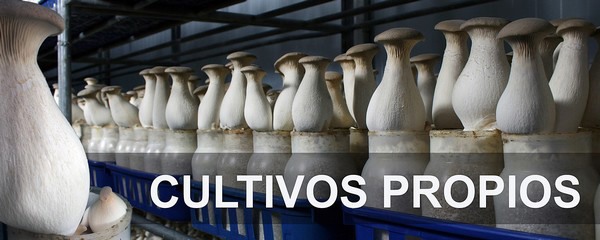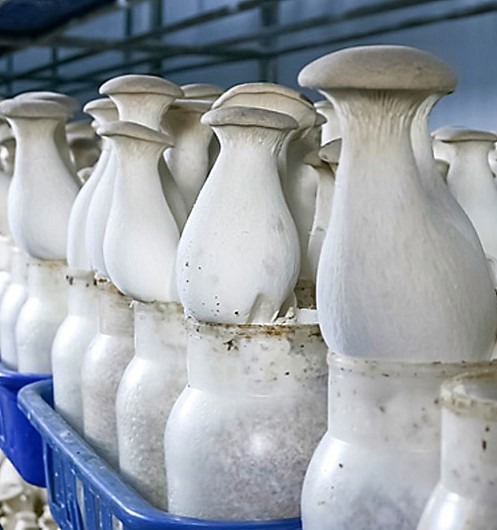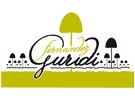Asia is undoubtedly the main mushroom producing region in the world, with 83% of the global production, which, according to FAOSTAT data, amounted to 11.9 million tons in 2019. It is also the place of origin of the cultivation system for the production of Pleurotus eryngii, more popularly known as thistle mushroom, implemented by Fernandez Guridi Fungi in a pioneering manner in Europe.
"The Pleurotus eryngii was being imported to Spain from Asia. What we decided to do was to import the production model for the cultivation of this mushroom so we could produce it in our Pradejón plant," says César Fernández Guridi. "The novelty of this system is that the Pleurotus eryngii is grown in bottles, controlling the amount of light the mushrooms receive and the CO₂ levels to which they are exposed throughout their growth cycle."

"Once we inoculate the mycelium into the substrate, which is manufactured at the Agruset cooperative of which we are founding partners, we place the bottles in a climate-controlled cultivation room with the necessary conditions for them to start developing: 90% humidity, normal initial CO₂ levels and light."
"Right when the fungi start sprouting, we remove the light and raise the CO₂ levels. In this way, we get the feet of the mushrooms to elongate and the caps not to open, allowing us to obtain Pleurotus eryngii with a trunk almost as thick as the head," says César. "About 25-30 mushrooms sprout in each bottle. When their size reaches between 4 and 6 cm, we harvest them and leave only 1 or 2, which grow to between 10 and 15 cm in height. We also market the mini eryngii, both alone and in trays combined with Pleurotus ostreatus and shiitake (Lentinus edodes), the two other kinds of mushrooms in which we are specialized."

Higher yields per volume of substrate
The Asian cultivation system used by Fernández Guridi Mushrooms not only makes it possible to produce large Pleurotus eryngii with its characteristic morphology and to offer consumers a fresh and local product instead of imported mushrooms; it also, as César Fernández points out, increases the net yield per volume of compost.
"The bottles in which we cultivate have enough capacity for 700 grams of compost. With other mushrooms, the productivity on the substrate ranges between 15 and 20%, but in the cultivation in bottles we exceed 35%. From the 700 grams of compost we obtain more than 250 grams of product, something that is also achieved thanks to the thinning we do at the beginning of the cultivation process, which allows the mushrooms we leave in each bottle to thicken and grow," he says. "Each cultivation cycle lasts 3 weeks, after which we empty the jars. We reuse all the materials, refill them with compost and start a new cycle."
"We implemented this production system for Pleurotus eryngii in 2014. The first 3 or 4 years were somewhat more challenging. In that period, we were conducting studies to improve the raw materials and the cultivation technique. Today our production amounts to between 50 and 60 tons."
The company controls the entire production process. The substrate is produced by the Agruset cooperative and Hongos Fernández Guridi cultivates, handles, packages and markets the three mushroom species it works with. "Our production goes almost entirely to the domestic market. Exports for now only represent 5% of our sales. Mushrooms are a very perishable product and we highly appreciate having local customers. We work with all kinds of customers, supermarkets, catering suppliers and fruit and vegetable stores. In fact, the retailer Eroski buys our mushroom assortments and distributes them through its large perishables platform in northern Spain, located just an hour and a half from our facilities, loading 6 days a week."
"The Pleurotus ostreatus is a mushroom that is sold everywhere. The shiitake, too; its introduction took longer, but today it is in all chains and works very well in restaurants. The Pleurotus eryngii is already on the shelves, but its main target is the foodservice channel. In Spain, only two companies market this mushroom and we are finding more and more customers who know us and who don't mind paying more for a higher quality, fresher and, moreover, local product.
 For more information:
For more information:
César Fernández Guridi
Hongos Fernández Guridi
C/ Prado, 3
26510 Pradejón, La Rioja, Spain
Tel.: +34 658 956 120
cesar@hongosfernandezguridi.com
www.hongosfernandezguridi.com
